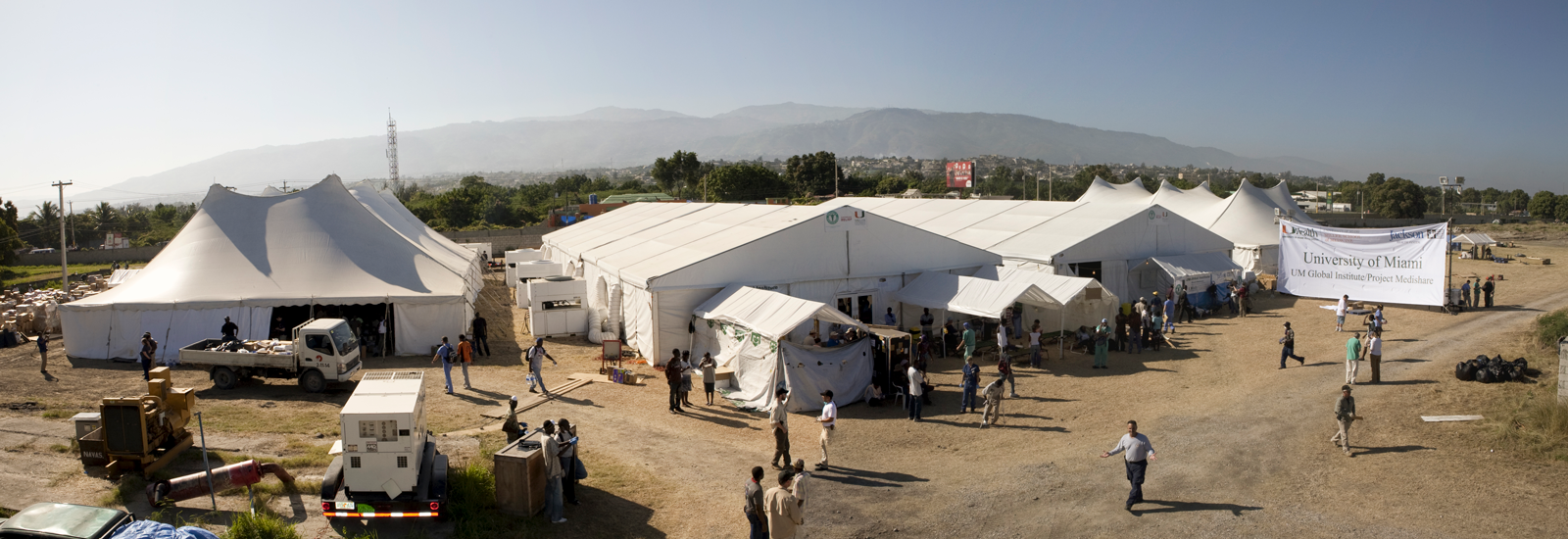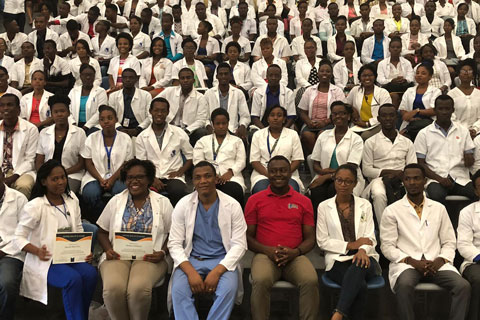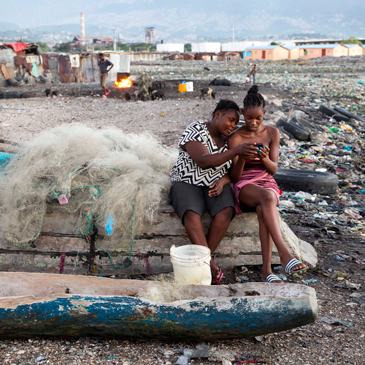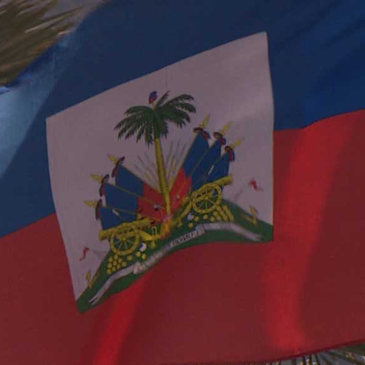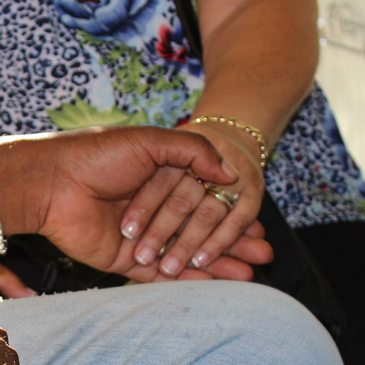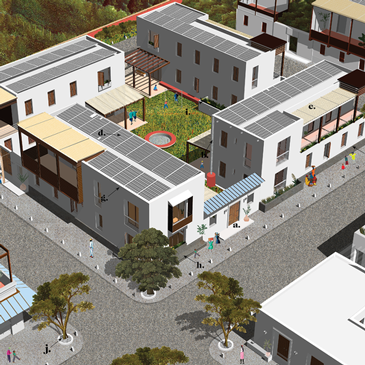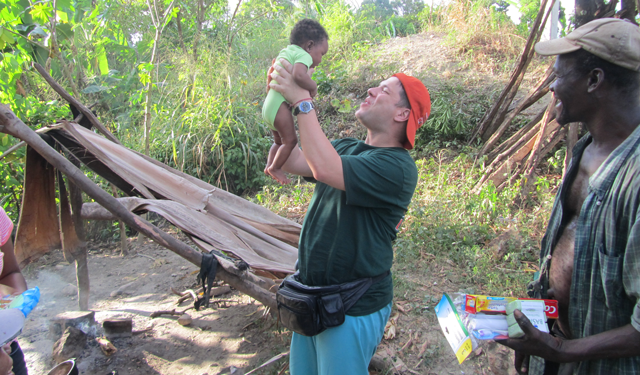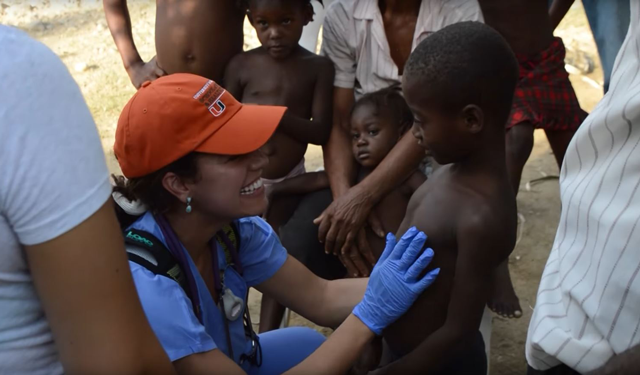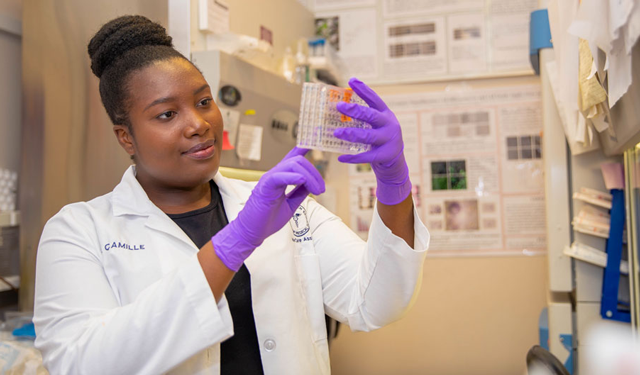That was the fledgling goal back in September 2009, when Elizabeth Greig, then a Miller School student and Project Medishare volunteer, unveiled a plan for dealing with a major emergency in Haiti. A few training sessions for staffing a level-one trauma and critical care center, similar to UM/Jackson’s Ryder Trauma Center, were underway when the late-afternoon 7.0-magnitude temblor left the Haitian capital in ruins, and the survivors in unimaginable pain and misery.
The very next morning, Dr. Barth A. Green, then the chair of the Miller School’s Department of Neurosurgery who had cofounded Project Medishare in 1985 to bring community health care to Haiti’s isolated Central Plateau, landed at the international airport with four trauma specialists from Ryder Trauma Center. As the first outside rescue team to arrive in Port-au-Prince, they launched what became the largest, most enduring emergency medical response ever undertaken by a university. Made possible by the ISTAT and Airlink aviation groups and support from corporations, philanthropists, and more than $13 million in donations from South Florida and beyond, the historic airlift of volunteers and tons of equipment that followed laid the foundation for the trauma and critical care network Green envisioned when he mentored Greig, now the medical director of UHealth on Fisher Island, on her theoretical plan.
In just eight days, the University and Project Medishare opened a 240-bed critical care hospital in four white tents on the edge of the Haitian national airport. Staffed for four months by 5,000 UM/Jackson and other volunteers from around the world, the hospital treated more than 30,000 earthquake survivors before having to vacate the airport property. But instead of packing up and leaving Haiti, the field hospital moved to Bernard Mevs Hospital, a small out-patient surgery clinic directed by Project Medishare’s long term collaborators, Drs. Marlon and Gerry Bitar, that evolved into Haiti’s most comprehensive critical care, trauma, and rehabilitation center.
Today, Bernard Mevs is staffed entirely by Haitian physicians, nurses, and allied healthcare professionals—many who were trained and are still mentored by UM faculty who helped establish the hospital’s intensive care units, pharmacy, pathology lab, wound care program, and pediatric and neurosurgery residency programs. With support from Haiti’s Ministry of Health, other partners and hundreds of volunteers, many of them students from the Miller School and the School of Nursing and Health Studies, Project Medishare also continues bringing community health services to 75,000 people in the Central Plateau, where, after the earthquake, it opened two maternal health centers that have almost eliminated maternal and neonatal deaths, recently the highest in the hemisphere.
“The University and Project Medishare are among the very few organizations that maintained their response, which is really rather unique,” said Greig, who oversaw patient transfers and logistics at the tent hospital and is helping Green organize the Miller School’s comprehensive intermediate and long-term medical relief efforts on the Bahamian islands devastated by Hurricane Dorian in September 2019.
“Usually,” Greig continued, “people forget when the disaster falls out of the news cycle. That’s not how it should be and it’s not how it was, and I’m really proud of that. The impact UM has had on the health care landscape of Haiti is really something to behold, an accomplishment that I think gets lost in the day-to-day of how tough and slow it is to work there.”
But the lessons learned in Haiti about the unintended harm that can come from doing good were not lost, and are now guiding the response in the Bahamas. Green regrets that the University and Project Medishare initially made the mistake of excluding the Haitian health care sector from their activities at the tent hospital, a mistake that was rectified at Bernard Mevs.
“We didn't say, ‘Come in, and work side by side with us,’ and we didn’t charge for our services, so the whole time we were operating the local doctors, the nurses, the pharmacies, the surgical supply, and medical supply companies had no business because we took it all,” Green said. “It was one of the biggest lessons I learned and that Project Medishare learned from the earthquake—and that is whenever you have the privilege of going into a nation in need you have to respect their own infrastructure and you have to strengthen it, not destroy it.”
That’s been especially tough over the past 18 months of street protests in Haiti that, fueled in part by President Jovenel Moïse’s inability to control rising gas prices, political corruption, and unemployment, have exacerbated Haiti’s economic woes, and briefly halted construction of the $40 million trauma and critical care center rising on land donated by Haiti’s business community. The unrest also forced Green, Ford, Greig, and other UM faculty who work in Haiti and serve on Project Medishare’s board of directors to cancel their plans to commemorate the 10-year anniversary of the earthquake in Haiti.
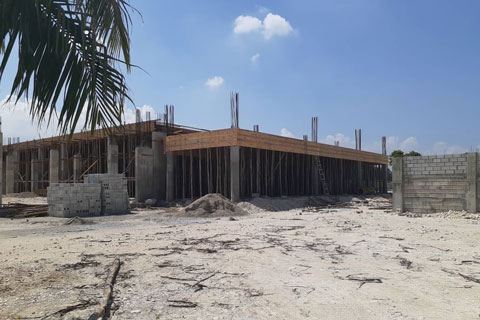
Yet Green, now the executive dean of global health and community service, remains optimistic that the initial phase of the trauma and critical care center, which broke ground last year on the edge of Port-au-Prince’s Cité-Soleil, one of the largest and most violent slums in the hemisphere, could still open this year.
A quarter century after he fell in love with the Haitian people, Green has faith not only in their resilience, courage, creativity, and spirituality, but in the growing cadre of UM faculty, staff, residents, and students who, like him, are committed to providing what he says Haitians need most.
“They just need one thing: the big O—opportunity,” Green said. “For too long, Haiti was an island of entitlement floating in a sea of NGOs, each with their own agendas. The ones that hang in there despite all the challenges remain because they appreciate how amazing the Haitian people are. We just need to overwhelm the country with a big tidal wave of opportunity.”
As a pediatric surgeon who, after the earthquake, began operating on infants with life-threatening anomalies at Bernard Mevs, Ford has witnessed the powerful ripple effect of opportunity. Before UM established Bernard Mevs's pediatric residency program, too many infants died from inadequate post-operative care after Ford and his surgical team departed. But today, most babies thrive, thanks to the growing skills of the pediatric nurses and physicians who trained there—and one day might staff Haiti’s first level one trauma and critical care hospital.
“They provide such a high level of care that children who were dying 10 years ago are now surviving,” Ford said. “I am so honored to be the dean of a school that has done so much to improve the condition of the Haitian people. But that’s our job. Sitting at the gateway to Latin America and the Caribbean, we have an obligation to make sure our sister nations are equipped to take care of their own. That is part of our responsibility as the hemispheric university our president, Julio Frenk, envisions.”



